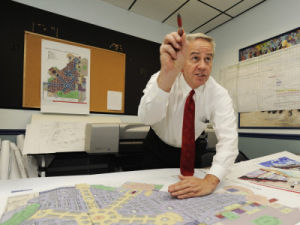There are remaining questions that need to be answered.
Did the 'partners' approve of the 'cash payments'?
Who was complicit?
Plainridge boss faces tough questions over finances
Friday, July 26, 2013
BY EMILY O'DONNELL SUN CHRONICLE STAFF
The Sun Chronicle

Gary Piontkowski talks about plans for Plainridge that are tied to pending action at the Statehouse. (Staff file photo by Martin Gavin)
BOSTON — Plainridge President John Grogan was feeling the heat as gaming and investigation officials grilled him at a hearing Thursday afternoon to determine if the Plainville racetrack is suitable to hold the state’s only slot machine parlor license.
In his testimony before the state gaming commission and investigation board, Grogan explained how former Plainridge President Gary Piontkowski pocketed money from the company for years without detection.
Grogan said Piontkowski had “a capital withdrawal accommodation” from which he often made small personal cash withdrawals.
Grogan said his understanding was that rather than repaying the money, Piontkowski account would eventually be settled “as positive funds flowed into the company.”
When the money was not repaid, Plainridge’s accountant justified the deficit has a “distribution,” the president said to the gaming commission.
The company never asked Piontkowski to repay the money he allegedly took, and granted him a severance package when he retired in April, Grogan said, in an effort to sever his ties to the company as quickly as possible.
Grogan was asked if he saw any financial statements, to which the president answered “I saw annual financial statements.”
Grogan then clarified that he did not notice that a “distribution” was going solely to one person, Piontkowski.
Gayle Cameron, a member of the state Gaming Commission, which will determine which of five applicants will receive the slot license, pressed Grogan, asking “Who was the accommodation by?”
“The accommodation was by the major shareholders of the company,” Grogan answered.
Ourway, the corporate entity under which Plainridge submitted its slot license application, had 15 members, with two major shareholders, Alfred Ross, the company’s manager and Stanley Fulton, chief financial officer.
Both Fulton and Ross were interviewed by the investigative arm of the Gaming Commission. In the resulting report, Fulton said he had no recollection of approving such distributions.
Ross said in the interview Piontkowski had “too much control” over the company’s funds.
Cameron questioned Grogan’s thoughts on Piontkowski’s actions because the current president has spoken favorably of Piontkowski in the past.
“Let me be clear. Gary was a personal friend, but his actions were unacceptable,” Grogan said. “It should have never happened.”
The hearing is part of a day of turmoil for Plainridge, one that potentially jeopardizes its 14-year bid to bring slot machines to the Route 1 track.
According to a report in the Boston Globe, which was confirmed at today’s hearing, Piontkowski made personal cash withdrawals from the struggling track’s money room “almost on a daily basis” for years, according to the Globe report.
At the time of Piontkowski’s departure, Plainridge suggested he had retired and sold his stake in the venture due to health concerns. But a report from the gambling commission’s investigative arm revealed that — after meeting with investigators and reviewing Piontkowski’s conduct — the track’s majority owners “decided that it was not in the company’s best interest to have Piontkowski remain as president,” according to a copy of the report obtained by the Globe.
Investigators were unable to confirm whether the track’s majority partners had knowingly approved the withdrawals, the report states.
In addition, Plainridge CFO Tim Petersen has resigned, the state’s gaming commission learned this morning. Petersen had been scheduled to testify at today’s hearing.
Karen Wells, director of the Gaming Commission’s investigative arm, said at the hearing Petersen’s absence is “troubling” and “raises grievous concerns” about Petersen’s financial practices while with the company.
Plainridge officials made clear that neither Piontkowski nor Petersen represent the racecourse, and maintain that their case for the slots license remains strong.
Grogan said in a prepared statement: “The rigorous review of our application by the I.E.B. has made the Plainridge Racecourse an even stronger applicant. We remain very excited by our application’s prospects.”
http://www.thesunchronicle.com/news/local_news/plainridge-boss-faces-tough-questions-over-finances/article_57572973-2458-5d6d-b8bf-44e4f4847097.html?_dc=200824801344.4245






No comments:
Post a Comment